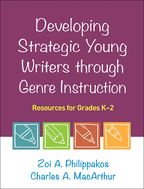Developing Strategic Young Writers through Genre Instruction
Resources for Grades K-2
Zoi A. Philippakos and Charles A. MacArthur
Foreword by Jill Fitzgerald
HardcoverPaperbacke-bookprint + e-book
Hardcover
orderDecember 19, 2019
ISBN 9781462540594
Price: $65.00 284 Pages
Size: 8" x 10½"
Paperback
orderDecember 19, 2019
ISBN 9781462540556
Price: $43.00284 Pages
Size: 8" x 10½"
Tested and fine-tuned in K–2 classrooms, this book provides engaging lessons and materials for teaching the three genres of writing—opinion, procedural, and story—that provide a foundation for beginning writers’ persuasive, informative, and narrative writing skills. The authors' approach integrates strategy instruction, self-regulated learning, and dialogic interactions such as role play. Packed with 55 reproducible planning forms and student handouts, the book makes connections between writing and reading in ways that support growth in both areas, address learning standards, and promote writing across the instructional day. Appendices contain numerous resources to support teachers’ and administrators’ professional learning. The large-size format facilitates photocopying; purchasers also get access to a Web page where they can download and print the reproducible materials.
See also the authors' Developing Strategic Writers through Genre Instruction: Resources for Grades 3–5.
See also the authors' Developing Strategic Writers through Genre Instruction: Resources for Grades 3–5.
“A 'must have' and 'must read' for K–2 teachers looking to understand how writing and reading work together to improve thinking and understanding across the curriculum. Philippakos and MacArthur provide clear lessons, examples, and explanations that connect the strategies and content between K–2 and later grades. The attention to language and dialogue is wonderful. This book will help you fill your classroom with talk and authentic conversations that strengthen students’ understanding of genres.”
—Amanda Lankford, EdS, Assistant Principal, Patterson Elementary School, Pierce County, Georgia
“This spectacular resource presents a comprehensive approach to teaching writing that skillfully fuses cognitive strategy instruction with dialogic interactions. The lessons and materials—such as sentence frames, evaluation rubrics, graphic organizers, and explicit explanations—provide teachers with the necessary tools to meet the writing needs of all K–2 students. This book will be beneficial for beginning as well as established teachers, enabling them to teach strong writing skills and develop dynamic writers.”
—Karen M. Picerno, MEd, second-grade teacher, Socrates Academy, Charlotte, North Carolina
“Getting off to a good start in learning to write is critical for school success. Philippakos and MacArthur provide primary-grade teachers with the tools to make this happen. Teachers will love this book!”
—Steve Graham, EdD, Warner Professor, Mary Lou Fulton Teachers College, Arizona State University
“Philippakos and MacArthur understand writing research, and they have a track record in working collaboratively with teachers. This book provides practical information in an accessible format for easy application to real classrooms. The 'strategy for teaching strategies' is a supportive framework that guides teachers through a teaching process leading to student growth. Most of all, teachers will treasure the lesson plans, which model how to offer genre-based strategy instruction with a self-regulation focus to support all writers in the primary-grade classroom. This book is a winner!”
—Carol Sue Englert, PhD, Department of Counseling, Educational Psychology and Special Education, College of Education, Michigan State University
Table of Contents
1. Writing Strategically: An Introduction to Genre-Based Strategy Instruction
2. Strategies within Genre-Based Strategy Instruction
3. Sequence of Instruction: A Strategy for Teaching Strategies
4. Responses to Reading and Opinion Writing
5. Procedural (How-to) Writing
6. Story Writing
7. Language and Grammatical Correctness for Meaning Making
Appendices
1. Reading Guides for Professional Learning Community (PLC) Discussions
2. Assessment-Grouping Guidelines
3. Questions for Journal Entries
4. Questions for PLC Meetings
5. Pacing Guide
6. Report-Writing Resources
7. A Guiding Checklist for Principals and Literacy Leaders
About the Authors
Zoi A. Philippakos, PhD, is Associate Professor of Reading and Elementary Education in the College of Education at the University of North Carolina at Charlotte. Her research interests include reading and writing instruction for students in the elementary grades, strategy instruction and self-regulation, and approaches to professional development for classroom teachers. A former elementary school teacher and literacy coach, Dr. Philippakos is coauthor of Differentiated Literacy Instruction in Grades 4 and 5 and Effective Read-Alouds for Early Literacy.Charles A. MacArthur, PhD, is Professor Emeritus of Special Education and Literacy in the School of Education at the University of Delaware. A former special education teacher, Dr. MacArthur has been conducting research on writing development and instruction for struggling writers since the 1980s. Most recently, he was principal investigator on two grants to develop and examine the efficacy of a writing curriculum for college basic writing courses. Other research projects have focused on the development of a writing curriculum for students with learning disabilities, writing strategy instruction, decoding instruction in adult education, speech recognition as a writing accommodation, project-based learning in social studies in inclusive classrooms, and first-grade writing instruction. Dr. MacArthur is a Fellow of the American Educational Research Association and a recipient of a research award from the Council for Exceptional Children. He has served as coeditor of the Journal of Writing Research and the Journal of Special Education, has published over 125 articles and book chapters, and is coeditor or coauthor of several books.
